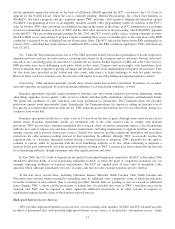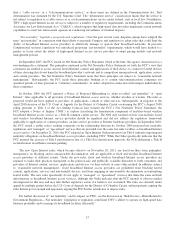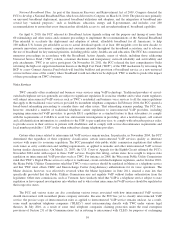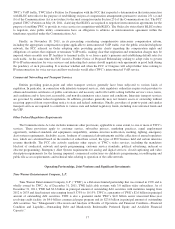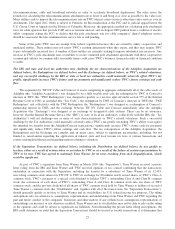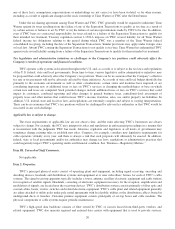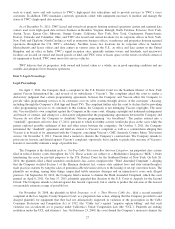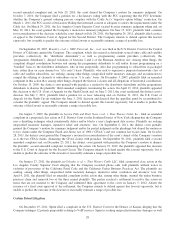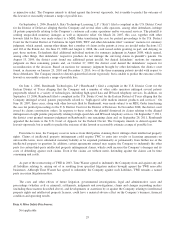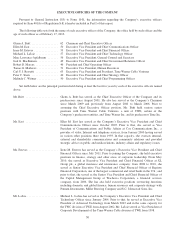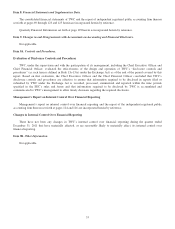Time Warner Cable 2011 Annual Report Download - page 32
Download and view the complete annual report
Please find page 32 of the 2011 Time Warner Cable annual report below. You can navigate through the pages in the report by either clicking on the pages listed below, or by using the keyword search tool below to find specific information within the annual report.Under the program carriage rules, TWC could be compelled to carry programming services that it would not otherwise
carry.
The Communications Act and the FCC’s “program carriage” rules restrict cable operators and MVPDs from
unreasonably restraining the ability of an unaffiliated programming vendor to compete fairly by discriminating against the
programming vendor on the basis of its non-affiliation in the selection, terms or conditions for carriage. The FCC’s Adelphia/
Comcast Transactions Order imposes certain additional obligations related to these rules, and, in August 2011, the FCC
issued a program carriage order and further notice of proposed rulemaking, which TWC and the National Cable and
Telecommunications Association appealed to the U.S. Court of Appeals for the Second Circuit. Under a successful program
carriage complaint, TWC might be compelled to carry programming services it would not otherwise carry and/or to do so on
economic and other terms that it would not accept absent such compulsion. TWC is currently the defendant in a program
carriage complaint. See “Business—Regulatory Matters—Video Services—Program carriage and Adelphia/Comcast
Transactions Order.” Compelled government carriage could reduce TWC’s ability to carry other, more desirable
programming and non-video services, decrease its ability to manage its bandwidth efficiently and increase TWC’s costs,
adversely affecting TWC’s competitive position.
“Net neutrality” legislation or regulation could limit TWC’s ability to operate its high-speed data business profitably and
to manage its broadband facilities efficiently.
On December 21, 2010, the FCC adopted an Open Internet Order imposing net neutrality obligations on broadband
Internet access providers. The new Open Internet rules, which became effective on November 20, 2011, are based on
principles of transparency, no blocking and no unreasonable discrimination and are applicable to fixed and wireless
broadband Internet access providers to different extents. Under the new rules, fixed and wireless broadband Internet access
providers, including TWC, are required to make their practices transparent to both consumers and providers of Internet
content, services, applications and devices on both the website and at the point-of-sale. In addition, subject to “reasonable
network management,” fixed broadband Internet access providers, including TWC, are prohibited from blocking lawful
content, applications, services and non-harmful devices, and from engaging in unreasonable discrimination in transmitting
lawful traffic.
In order to continue to provide quality high-speed data service at attractive prices, TWC needs the continued flexibility
to develop and refine business models that respond to changing consumer uses and demands, to manage bandwidth usage
efficiently and to continue to invest in its systems. It is unclear how the FCC’s net neutrality regulations will be implemented
now that they have become effective, and how “reasonable network management” will be determined. The new regulations
could adversely impact TWC’s ability to operate its high-speed data network profitably and to undertake the upgrades and
put into operation management practices that may be needed to continue to provide high quality high-speed data services and
could negatively impact its ability to compete effectively. For a description of the obligations that became effective late last
year, see “Business—Regulatory Matters—High-speed Internet Access Services—‘Net neutrality’ legislative proposals and
regulations.”
Rate regulation could materially adversely impact TWC’s operations, business, financial results or financial condition.
Under current FCC regulations, rates for basic service tier or BST video service and associated equipment are permitted
to be regulated. In over 75% of the communities it serves, TWC is not subject to BST video rate regulation, either because
the local franchising authority has not asked the FCC for permission to regulate rates or because the FCC has found that there
is “effective competition.” Also, there is currently no rate regulation for TWC’s other services, including high-speed data and
voice services. It is possible, however, that the FCC or Congress will adopt more extensive rate regulation for TWC’s video
services or regulate the rates of other services, such as high-speed data and voice services, which could impede TWC’s
ability to raise rates, or require rate reductions, and therefore could cause TWC’s business, financial results or financial
condition to suffer.
TWC may encounter substantially increased pole attachment costs.
Under federal law, TWC has the right to attach cables carrying video and other services to telephone and similar poles
of investor-owned utilities at regulated rates. However, because these cables may carry services other than video services,
such as high-speed data services or new forms of voice services, some utility pole owners have sought to impose additional
fees for pole attachment. On April 7, 2011, the FCC adopted an Order comprehensively revising its pole attachment rules.
The new rules, which became effective June 8, 2011, seek to improve the efficiency and reduce the costs of deploying
24


